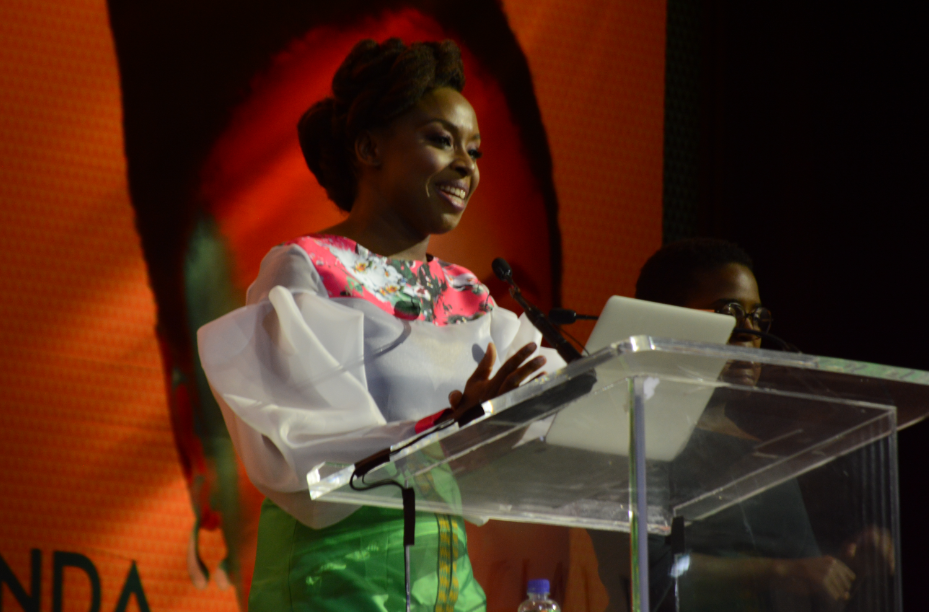“When it comes to history and memory … it’s easy to remember Nelson Mandela, because he is Nelson Mandela. Who determines whose story we value above others?”
This was a question asked by Cathy Mohlahlana, the facilitator of a panel discussion at the Nelson Mandela Tribute to mark the fifth anniversary of his passing.
Celebrated author and notable feminist Chimamanda Ngozi Adichie was the keynote speaker at the event hosted by the Nelson Mandela Foundation at the UNISA Ormonde campus in Johannesburg, South Africa on December 12, 2018.

Soweto Gospel Choir
at the Nelson Mandela Tribute on
December 12, 2018. Picture: Karen Mwendera
Soweto Gospel Choir
at the Nelson Mandela Tribute on
December 12, 2018. Picture: Karen Mwendera

Soweto Gospel Choir
at the Nelson Mandela Tribute on
December 12, 2018. Picture: Karen Mwendera
Soweto Gospel Choir
at the Nelson Mandela Tribute on
December 12, 2018. Picture: Karen Mwendera
Before Adichie’s address, the audience was regaled by the sounds of the Soweto Gospel Choir who sang songs such as Thina Sizwe, Lizalise Idinga Lakho, and Brenda Fassie’s Vul’indlela.
In paying homage to other anti-apartheid activists, the choir concluded their performance with the Peter Gabriel song Biko. The song is named after Bantu Stephen Biko who died in police detention in 1977, and was at the forefront of the anti-apartheid campaign the Black Consciousness Movement.
Loading...
Nelson Mandela Foundation chief executive Sello Hatang also acknowledged Pan Africanist liberation hero Robert Mangaliso Sobukwe, who he says was a “towering figure in our history and a man who the apartheid regime tried to erase from memory”.

Chimamanda Ngozi Adichie gave the keynote address
at the Nelson Mandela Tribute on
December 12, 2018. Picture: Karen Mwendera
Sebabatso Moneli
at the Nelson Mandela Tribute on
December 12, 2018. Picture: Karen Mwendera

Nelson Mandela Foundation chief executive Sello Hatang
at the Nelson Mandela Tribute on
December 12, 2018. Picture: Karen Mwendera
UNISA Principal and Vice-Chancellor
Mandla Makhanya
at the Nelson Mandela Tribute on
December 12, 2018. Picture: Karen Mwendera
In recognizing the role played by women in the struggle for South Africa’s liberation Hatang said, “we should also remember that this year is about mme (mother) Albertina Sisulu, and those women whose stories and contributions were distorted an minimized by the structures of patriarchy … We should also remember that this is the year we lost mama Winnie Madikizela Mandela.”
Activist and wife of late former President Nelson Mandela, Graça Machel, was also in attendance and listened attentively as Adichie spoke about the power of memory and public imagination. “When I first came to South African ten years after the fall of apartheid, it felt to me as though the past was not yet passed, but that there was a concerted collective resolve to turn away from this truth. South Africans of all races spoke to me of the rainbow nation, and I did not entirely trust this optimism. Well-choreographed as it was.”
“It felt to me a little too easy … It cannot be so unbearably, terribly tidy this process of peace-making,” Adichie said.

Cathy Mohlahlana,
Neo Muyanga, Chimamanda Ngozi Adichie and
Sebabatso Moneli
at the Nelson Mandela Tribute on
December 12, 2018. Picture: Karen Mwendera
Cathy Mohlahlana facilitates panel discussion at
the Nelson Mandela Tribute on
December 12, 2018. Picture: Karen Mwendera

Njabulo Ndebele, Chimamanda Ngozi Adichie and
Graça Machel
at the Nelson Mandela Tribute on
December 12, 2018. Picture: Karen Mwendera
Graça Machel receives a plaque
at the Nelson Mandela Tribute on
December 12, 2018. Picture: Karen Mwendera
Sebabatso Moneli and Neo Muyanga were part of the panel discussion facilitated by Mohlahlana.
“We are entitled to rage. We are entitled to anger – to the grief of a painful history. But, we are also invited by history to a breath of stories that expand beyond the stereotypes of slavery and colonialism.
“African history is vast and I believe that part of the freedom that we are looking for, that our true liberation will not be found in the absence of tension, but in embracing the tension of history,” Moneli said.

Nelson Mandela Tribute on
December 12, 2018. Picture: Karen Mwendera
Nelson Mandela Tribute on
December 12, 2018. Picture: Karen Mwendera

Nelson Mandela Tribute on
December 12, 2018. Picture: Karen Mwendera
Nelson Mandela Tribute on
December 12, 2018. Picture: Karen Mwendera
While interrogating the idea of telling the facts and the truth, Muyanga added, “the responsibility is all of ours … The process of colonization which is premised on the idea of erasing the original memory and replacing it with the colonists’ memory. So history begins with the arrival of the colony as opposed to the stories we tell of ourselves before.”
Loading...
